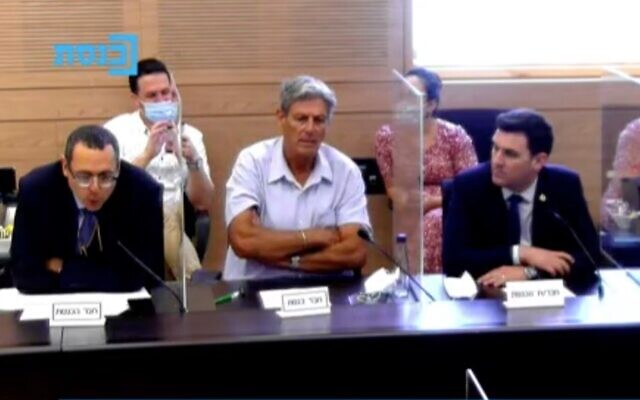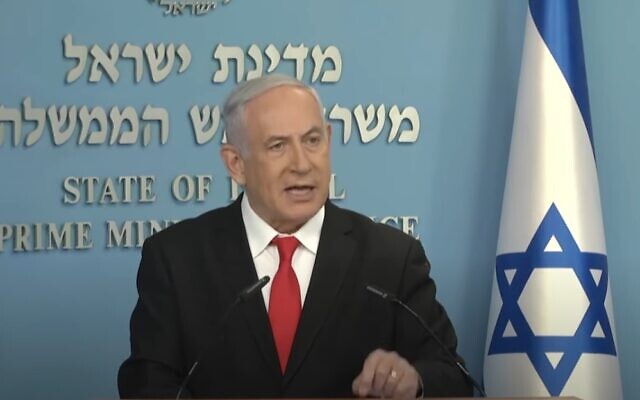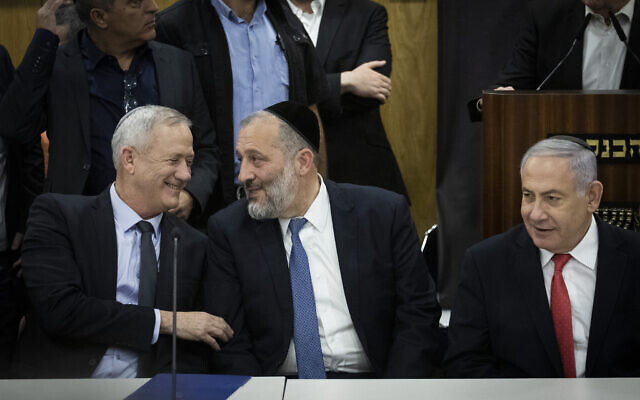Move comes after Netanyahu backs proposal to push off Monday’s budget deadline, likely averting 4th round of elections for now

A key Knesset committee passed a proposal early Monday that will push off the deadline to pass a state budget, likely averting the immediate threat of new elections.
The Knesset Finance Committee passed the measure in a second and third reading after an all night session to push off Monday night’s budget deadline by 120 days, delaying the possibility that Israelis will go to the polls for the fourth time since April 2019.
If the Knesset had failed to pass the delay bill, sponsored by MK Zvi Hauser, by Monday night, the government would automatically fall and new elections will be set.
The vote came after Prime Minister Benjamin Netanyahu on Sunday said he would accept the compromise proposal.
“Out of national responsibility I decided to accept the compromise proposal of MK Hauser,” he said in a press conference at the Prime Minister’s Office in Jerusalem.
“This proposal allows the immediate flow of funds to citizens and the economy, and it prevents the need for elections,” Netanyahu said.

In response Blue and White issued a statement saying the proof will be in Netanyahu’s actions, and urging him to “keep your promise, prevent elections and live up to the agreement” — an apparent reference to the coalition deal between the parties.
Channel 12 reported that Blue and White was still not entirely convinced that Netanyahu will indeed ensure that the election crisis is over. Officials told the network that the party will believe it only if and when the final vote delaying the budget is passed sometime before midnight on Monday.
Hauser, for his part, said he was “happy to hear” that Netanyahu accepted his proposal.
While saying at the press conference it was “time for unity and not for elections,” Netanyahu accused his Blue and White partners of acting as a “government inside the government” and repeated an unfounded claim that a criminal case against Justice Minister Avi Nissenkorn was secretly closed by Attorney General Avichai Mandelblit, who the premier and his allies have frequently railed at for indicting him in a series of graft cases. If such a case had involved a right-wing politician, Netanyahu said, it would have been all over the media.
Nissenkorn tweeted in response: “The well-timed campaign of incitement and lies won’t deter me. I’ll continue to protect the rule of law and Israeli democracy.”
Netanyahu said Israel needs to “work together” to meet the challenges it faces, including battling COVID-19 and its economic fallout, thwarting Iran, bolstering security, and concluding further normalization agreements with Arab states. “Let’s unify and work together for these important goals,” he said.
He also urged the national-religious Yamina party to join the government. Yamina later reportedly rejected the offer. “Netanyahu threw Yamina to the opposition and dismantled the right-wing bloc,” party sources were quoted saying by the national religious Srugim news site.
In an example of the dysfunctional relationship between him and the rival coalition party, Netanyahu indicated in response to a question that he had not informed Gantz ahead of the press conference that he was accepting the proposal to avert elections.
Netanyahu was also asked whether there will be a new crisis three months from now, and whether he will hand over the prime ministership to Gantz in November 2021 as promised. He said there was no need for crises, if the government functions properly.
Ahead of the press conference, a statement from Blue and White had called on Netanyahu “to get a grip and get back to seeing what’s good for the country, rather what’s good for him. While nine million citizens expect unity and the addressing of security [challenges] and the coronavirus, Likud is busy with political tricks.”

Besides delaying the budget deadline, reports have said that the proposed compromise will also see the parties approve additional spending, as they hash out a new budget; agree to focus on dealing with the coronavirus pandemic and the flu during the winter; as well as with the potential security threats on the northern and southern borders; and form a committee to weigh how senior officials are chosen.
No senior appointments will be made until the committee releases its conclusions, but Channel 12 reported Sunday that Likud was demanding an exception for the selection of a new police chief. Netanyahu denied making such a demand.
If Hauser’s bill clears the Knesset Finance Committee vote Sunday night, it must then be approved in its second and third plenum readings to become law.
Netanyahu’s announcement Sunday evening came after his ultra-Orthodox coalition allies, the Shas and United Torah Judaism parties, said a compromise deal had been reached that both Likud and Blue and White supported.
According to Hebrew media reports, they demanded and received the approval of an extra NIS 400 million ($117 million) for ultra-Orthodox yeshivas, which have been starved of funds, due to the lack of a budget.
The lack of a budget has meant that the government is operating according to the 2019 budget, limited to spending 1/12 of last year’s funds every month. Reports said the postponement law would include a clause mandating a 2.5 percent increase in funds for 2020 over 2019, part of which will go toward ultra-Orthodox seminaries.

Shortly before Netanyahu spoke, Channel 13 news published a poll showing Likud dropping from 36 to 31 seats if new elections were held today.
Following Likud in the poll was Opposition Leader Yair Lapid’s Yesh Atid with 19 seats and the national religious Yamina party — which was once allied with Netanyahu, but which was left out of the current government — predicted to surge to 18 seats.
The majority Arab Joint List was forecast to fall from 15 to 13 seats, while the poll said Blue and White would receive only 11.
MK Avigdor Liberman’s right-wing secularist Yisrael Beytenu party would pick up 8 seats, while Shas and UTJ would get 7 apiece and the left-wing Meretz party 6.
The Labor, Derech Eretz, Gesher and Jewish Home parties were all forecast to come short of the minimum electoral threshold.
Overall, the poll gave right-wing and religious parties 63 seats, enough for a majority when including Yamina.
The poll also found that 50% of respondents believed that the “main factor” influencing Netanyahu’s political decisions is “his legal future” and only 18% think he is primarily weighing “the interests of the state.”
If there were to be elections now, the poll found, 59% would hold Netanyahu responsible, and 20% Gantz.
At the heart of the ongoing coalition crisis is whether the government should pass a budget that includes 2021, as stipulated in the coalition agreement and backed by Gantz, or a budget that only covers the rest of 2020, as Likud has insisted due to the uncertainty caused by the pandemic.
Blue and White has accused Netanyahu of deliberately attempting to violate the coalition agreement with his sudden demand for a one-year budget in order to leave himself a future window during next year’s budget talks to dissolve the government. This would let him avoid having to hand over the prime minister post to Gantz in November 2021, as the coalition deal stipulates.
Netanyahu is also reportedly demanding greater power over senior appointments, including of top law enforcement officials, including the next state prosecutor, in contravention of previous agreements. In answer to a question on Sunday night, he said he had no intention of seeking to appoint a new police commissioner and new state prosecutor.
Foreign Minister Gabi Ashkenazi of Blue and White said Saturday that Netanyahu was pushing for elections for his “personal and legal reasons,” related to his trial, implying that the prime minister hopes a new, different Knesset might yield a majority of lawmakers willing to back legislation that could thwart the legal proceedings in the three graft cases against him.
Top economists say passing a budget that encompasses both 2020 and 2021 makes the most sense, as there would be little point for a 2020 budget just a few months before the year’s end. Netanyahu says uncertainty due to the pandemic makes it impossible to plan that far ahead.
President Reuven Rivlin has spoken in recent days with coalition party leaders with the goal of preventing another election. On Sunday, Rivlin said he had continued his round of talks to include Yisrael Beytenu party leader Avigdor Liberman, a member of the opposition.
As reported by The Times of Israel
